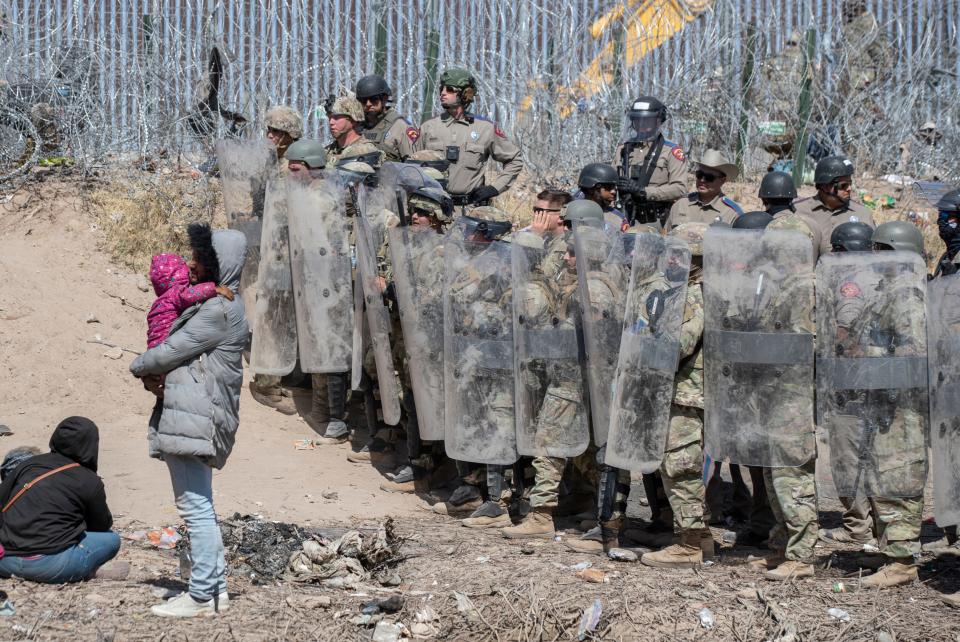5th Circuit Appeals Court hears arguments on SB 4, Texas immigration law remains on hold
The 5th U.S. Circuit Court of Appeals kept Senate Bill 4 — a sweeping Texas immigration policy — on hold Wednesday as it continues to consider whether it will overturn a lower court's injunction keeping the law from taking effect while constitutional challenges to it are adjudicated.
During Wednesday's hearing, a three-judge panel listened to arguments from both state and federal attorneys on whether SB 4 — which would authorize law enforcement officers in the state to arrest, detain and deport people suspected of entering the U.S. in Texas from Mexico without legal authorization — should remain on hold, but the appeals court ultimately concluded the roughly hourlong proceeding without handing down a decision and leaving the law shelved for now.
"This is going to be a massive new system if it's allowed to go into effect," said Cody Wofsy, an attorney with the ACLU representing the Texas Civil Rights Project, El Paso County, American Gateways, and Las Americas Immigrant Advocacy Center — which the U.S. Justice Department joined in January by suing Texas over legal challenges to SB 4.
The Justice Department and migrant advocacy groups say that SB 4 is unconstitutional as it oversteps into the federal government's authority over immigration. The state is arguing that amid a record-setting influx of migrants reaching the Texas-Mexico border, which top state GOP officials have likened to an invasion, Texas has the authority to secure its border, saying the Biden administration has been derelict in its duty.

Across previous court settings, federal prosecutors have bemoaned SB 4 as an interference in federal border policies, a hinderance to the nation's cross-border relationship with Mexico and an intrusion on federal authorities' ability to control ingress and egress along the country's southern border.
State lawmakers passed SB 4 in November, codifying a series of penalties for anyone suspected of crossing into Texas from Mexico other than through an international port of entry. The penalties range from a Class B misdemeanor to a second-degree felony. The law would allow the police in the state to arrest migrants suspected of entering the U.S. illegally and would authorize magistrate judges to deport them to Mexico, regardless of whether it's their country of origin, or face stiffer criminal penalties for noncompliance.
Despite a litany of constitutional concerns, which were first acknowledged by Judge David Ezra of the U.S. District Court for the Western District of Texas after a February hearing in Austin that resulted in his injunction order keeping SB 4 from taking effect on March 5 as scheduled by the state, the law was allowed to go live for about nine hours last month.
After the 5th Circuit on March 2 initially overturned the District Court's hold on SB 4, giving the U.S. Supreme Court about a week to intervene before the law went into effect, the high court on March 4 ruled to maintain the hold on SB 4 before it reversed its decision March 19, allowing the law to take effect. Hours later the 5th Circuit reversed its previous ruling and kept the lower court's injunction in place, putting SB 4 back on hold while the merits of the sweeping immigration policy are hashed out in federal court.
In arguing that Texas should not be preempted from enforcing SB 4, Texas Solicitor General Aaron Nielson defended the state's immigration policy as being complementary to federal immigration law.
"Now to be fair, maybe Texas went too far," Nielson said at the outset of the proceeding Wednesday. "And that's the question this court is going to have to decide."

In addressing Chief Judge Priscilla Richman's and Judge Irma Carrillo Ramirez's concerns over how the state would process deportations, Nielson said that "inaccurate factual premises about how SB 4 operates" has negatively clouded the intent and procedure of the law.
Nielson said state and federal officials would have to work together to carry out the law's removal provisions, as state law enforcement officers would have to conduct deportations through international ports of entry, which U.S. Border Patrol operates, and not simply drop off migrants along the border.
"That's not how it's going to be," Nielson said. "It's going to be people are taken to the port of entry, and the United States controls the port of entry."
Expressing disdain for the law, Mexico's federal government has condemned SB 4 — both in statements and in a brief filed with the 5th Circuit — as a policy to "stop the flow of migrants by criminalizing them, and encouraging the separation of families, discrimination and racial profiling that violate the human rights of the migrant community."
"Mexico categorically rejects any measure that allows state or local authorities to exercise immigration control, and to arrest and return nationals or foreigners to Mexican territory," the country's Ministry of Foreign Affairs said in an announcement in March.
This article originally appeared on Austin American-Statesman: 'Maybe Texas went too far': appeals court hears arguments over SB 4
Solve the daily Crossword

